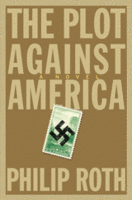 I'm finally reading Phillip Roth's latest novel, The Plot Against America, which imagines an America lead by Nazi sympathizer Charles Lindbergh instead of third-termer FDR. It's a chilling read with spooky parallels to today.
I'm finally reading Phillip Roth's latest novel, The Plot Against America, which imagines an America lead by Nazi sympathizer Charles Lindbergh instead of third-termer FDR. It's a chilling read with spooky parallels to today. Fritz Stern's In These Times essay "A Fundamental History Lesson" arrived in my inbox yesterday, minutes after setting Roth's book down. Stern was a boy growing up in Germany during Hitler's rise to power, so his look at how the mix of religion and politics in Germany's National Socialism movement paved the way for Nazi fascism is particularly credible and powerful—and eerily apropos of Roth's novel. As with Bush's frequent photo-ops, Roth's Lindbergh wins the presidency by flying the Spirit of St. Louis to every state in the union—and whenever any political problem arises, he resorts to the same image-rich, content-free fix—and, like Bush, Lindbergh (and Hitler) envokes God's name and denounces immoral liberalism at every turn. Stern writes:
Let’s consider not the banality of evil but its triumph in a deeply civilized country. After the Great War and Germany’s defeat, conditions were harsh and Germans were deeply divided between moderates and democrats on the one hand and fanatic extremists of the right and the left on the other. National Socialists portrayed Germany as a nation that had been betrayed or stabbed in the back by socialists and Jews; they portrayed Weimar Germany as a moral-political swamp; they seized on the Bolshevik-Marxist danger, painted it in lurid colors and stoked people’s fear in order to pose as saviors of the nation. In the late ’20s a group of intellectuals known as conservative revolutionaries demanded a new volkish authoritarianism, a Third Reich. Richly financed by corporate interests, they denounced liberalism as the greatest, most invidious threat, and attacked it for its tolerance, rationality and cosmopolitan culture. These conservative revolutionaries were proud of being prophets of the Third Reich—at least until some of them were exiled or murdered by the Nazis when the latter came to power. Throughout, the Nazis vilified liberalism as a semi-Marxist-Jewish conspiracy and, with Germany in the midst of unprecedented depression and immiseration, they promised a national rebirth.As Plot reaches its climax, Lindbergh disappears, anti-Semitic rioting ensues, and the vice president—an even bigger fascist than the prez—starts locking up Democrats and progressives, all in the name of national security. Anyone drawing parallels between today's cultural/political climate and those conditions Hilter capitalized on to take power run the risk of being accused of comparing Bush to Hitler. So I'll just compare the conditions that gave rise to Hitler to Roth's fictionalized account of those times. With that out, I ask: isn't this all vaguely familiar? The national crisis of 9/11 has paved the way for many amendments to the law previously unimaginable: detainment without charge or legal representation, state-sponsored "torture," erosion of civil rights, leveraging fears through a color-coded terror threat level indicator that's likely triggered not by increased threats but political events.
Roth's is a potent novel, one I'm not finished with and have barely had time to process, and I'd love to hear reader's thoughts on it.
2 comments:
The right wing have a different viewpoint, of course. They whine of the "criminalization of politics." I guess the same folks who were threatening the "nuclear option" on filibursters (forever altering US law) are now whimpering that the Valerie Plame was just a boys-will-be-boys bit of completely safe "politics." Fuck 'em.
I've been wondering lately about W's suitability to fulfill the rest of his term as president.
His comments about going after other middle-eastern nations, his seeing threats where there are none, his wild blinking, his continuing lying to the public, his direct conversations with God, the list goes on.
I'm no psychologist, but it seems to me that we're seeing symptoms of a guy losing his mind.
Post a Comment